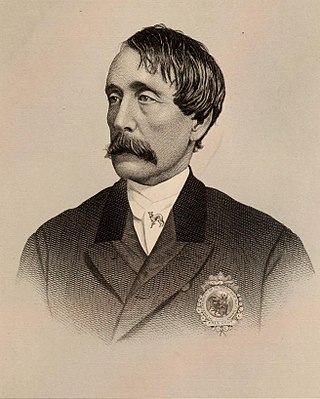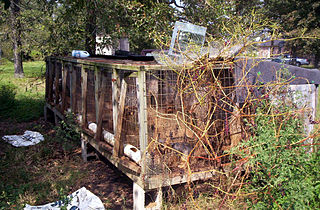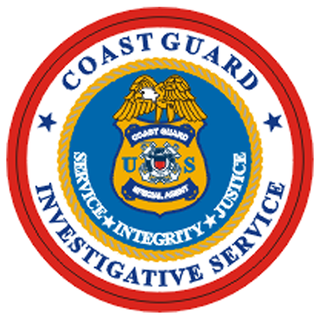
Henry Bergh founded the American Society for the Prevention of Cruelty to Animals (ASPCA) in April, 1866, three days after the first effective legislation against animal cruelty in the United States was passed into law by the New York State Legislature. One of the tasks he undertook was to pass a law that would prohibit the use of dogs for the monotonous and hot task of turning grills in restaurants. He made it. Later, when Bergh went to visit restaurants to monitor law enforcement, he discovered that numerous restaurants had replaced dogs with black children. Therefore, Bergh also prompted the formation, in 1874, of the New York Society for the Prevention of Cruelty to Children (MSPCC).
The American Society for the Prevention of Cruelty to Animals (ASPCA) is a non-profit organization dedicated to preventing animal cruelty. Based in New York City since its inception in 1866, the organization's mission is "to provide effective means for the prevention of cruelty to animals throughout the United States."

A puppy mill, also known as a puppy farm, is a commercial dog breeding facility characterized by quick breeding and poor conditions. Although no standardized legal definition for "puppy mill" exists, a definition was established in Avenson v. Zegart in 1984 as "a dog breeding operation in which the health of the mill’s dogs is disregarded to maintain a low overhead and maximize profits". They are cited as being a result of increased demand for household pets, especially after World War II. The Veterinary Medical Association of the Humane Society of the United States defines the main characteristics of a puppy mill as "emphasis on quantity over quality, indiscriminate breeding, continuous confinement, lack of human contact and environmental enrichment, poor husbandry, and minimal to no veterinary care."

A humane society is a group that aims to stop cruelty to animals. In many countries, the term is used mostly for societies for the prevention of cruelty to animals (SPCA). In the United Kingdom, and historically in the United States, such societies provide waterway rescue, prevention and recovery services, or may give awards for saving human life.
The police procedural, police show, or police crime drama is a subgenre of procedural drama and detective fiction that emphasizes the investigative procedure of police officers, police detectives, or law enforcement agencies as the protagonists, as contrasted with other genres that focus on non-police investigators such as private investigators.

An animal control service or animal control agency is an entity charged with responding to requests for help with animals, including wild animals, dangerous animals, and animals in distress. An individual who works for such an entity was once known as a dog catcher, but is generally now called an animal control officer, and may be an employee or a contractor – commonly employed by a municipality, county, shire, or other subnational government area.
A covert operation or undercover operation is a military or police operation involving a covert agent or troops acting under an assumed cover to conceal the identity of the party responsible. Some of the covert operations are also clandestine operations which are performed in secret and meant to stay secret, though many are not.

The Coast Guard Investigative Service (CGIS) is a division of the United States Coast Guard that investigates crimes where the U.S. Coast Guard has an interest. It is composed of civilian (GS-1811), active duty, reserve enlisted, and warrant officer special agents.
Cops is an American reality legal television documentary programming series that is currently in its 36th season. It is produced by Langley Productions and premiered on the Fox network on March 11, 1989. The series, known for chronicling the lives of law enforcement officials, follows police officers and sheriff's deputies, sometimes backed up by state police or other state agencies, during patrol, calls for service, and other police activities including prostitution and narcotic stings, and occasionally the serving of search/arrest warrants at criminal residences. Some episodes have also featured federal agencies. The show's formula follows the cinéma vérité convention, which does not consist of any narration, scripted dialogue or incidental music/added sound effects, depending entirely on the commentary of the officers and on the actions of the people with whom they come into contact, giving the audience a fly on the wall point of view. Each episode typically consists of three self-contained segments which often end with one or more arrests.

Brooklyn South is an American ensemble police drama television series that aired on CBS for one season from September 22, 1997, to April 27, 1998. It was aired during the 1997–98 television season. The series was co-created by Steven Bochco, Bill Clark, David Milch, and William M. Finkelstein.

The Genesis Awards are awarded annually by the Humane Society of the United States (HSUS) to individuals in the major news and entertainment media for producing outstanding works which raise public awareness of animal issues. Presented by the HSUS Hollywood Outreach program, the awards show takes place every March in California. The awards have honored such well-known personalities as Michael Jackson, Aaron Sorkin, Anderson Cooper, Peter Gabriel, Ellen DeGeneres, Jane Goodall, David E. Kelley, Paul McCartney, Arthur Miller, Stephen Colbert, Oprah Winfrey, Prince, Jacques Cousteau and Ian Somerhalder, as well as journalists, film and documentary writers and producers, print and broadcast news outlets in the United States.
Animal Cops is an American reality television franchise that was originally produced in the United States for Animal Planet. Animal Planet has also presented a special edition of Animal Cops with 2009 episodes such as "Back from the Brink" and "Extreme Danger". Also scenes from Animal Planet's other show "Animal Precinct" have been featured in "Animal Cops" special, "Cats: Born to Survive". This is due to "Animal Cops" being based on the "Animal Precinct" concept.
Tina Salaks, a resident of New York City, is a former special agent with the American Society for the Prevention of Cruelty to Animals (ASPCA) Humane Law Enforcement Division appearing in the "Animal Precinct" series on Animal Planet.

The ASPCA Humane Law Enforcement Division was the law enforcement arm of the American Society for the Prevention of Cruelty to Animals (ASPCA) from 1866 until 2013, when the law enforcement division was disbanded. The agency enforced humane laws, and investigated cases of animal cruelty.

The New York City Police Department (NYPD) is structured into numerous bureaus and units. As a whole, the NYPD is headed by the Police Commissioner, a civilian administrator appointed by the Mayor, with the senior sworn uniformed officer of the service titled "Chief of Department". The Police Commissioner appoints the First Deputy Commissioner as the department's second-in-command and the Chief of Department as the department's highest ranking uniformed officer. The commissioner also appoints a number of deputy and assistant commissioners who do not have operational command and are solely for support and administrative function. The department is divided into twenty bureaus, six of which are enforcement bureaus. Each enforcement bureau is further subdivided into sections, divisions, and units, and into patrol boroughs, precincts, and detective squads. Each bureau is commanded by a bureau chief. There are also a number of specialized units that are not part of any of the bureaus and report to the Chief of the Department.
Retired Lt. David J. Green. Dave served in the US Navy for four years in the Pacific. Lt. David Green became a police officer in 1960 with Metro Dade Police in Miami. He was a Special Agent Supervisor with Florida Department of Law Enforcement (FDLE), a Lieutenant with the Broward County Sheriffs Office, and finally, a Deputy with the Larimer County Sheriffs Office in Ft. Collins CO.

The New Jersey Society for the Prevention of Cruelty to Animals is a law enforcement agency in the state of New Jersey that focuses on humane law enforcement. The agency enforces animal-related laws and investigates cases of animal cruelty. In January 2018, Governor Chris Christie signed a bill intended to dissolve the organization and transfer animal cruelty law enforcement to county prosecutors, municipalities, and county SPCA agencies. The NJSPCA will cease law enforcement operations by August 1, 2018. The agency was disbanded in 2018 after a State Commission of Investigation Reports (SCI) showed that the agency could not account for over 700K in Attorney fees, mismanaged bank accounts, and businesses created by its board members. The agency was virtually bankrupt at the time it was disbanded due to a lack of oversight. The NJSPCA was sued in 2015 under the Open Public Record Act in which it spent 140K on Attorney's fee's. It was order on 4 separate occasions that they were a Government Agency and subject to OPRA. See Sci Report https://www.nj.gov/sci/pdf/SPCA-FollowUpReport.pdf
Humane law enforcement is the enforcement of laws relating to the humane treatment of non-human animals.










